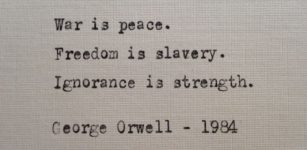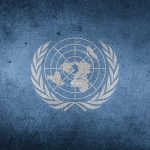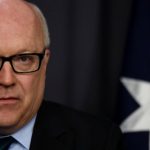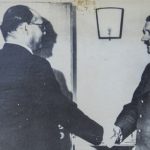1984: Dystopian Prophecies Become Reality

The week after Donald Trump’s inauguration in January last year, George Orwell’s novel Nineteen Eighty-Four became Amazon’s number one selling book. Penguin Books had to order a reprint of 75,000 copies to keep up with the increase in demand.
It seemed people wanted to remind themselves about what might be in store while Trump is in charge.
Indeed, the new administration kicked off the presidency with a dose of Orwellian doublespeak. After press secretary Sean Spicer greatly exaggerated the size of the crowds at the inauguration, presidential counsellor Kellyanne Conway explained that he was merely using “alternative facts.”
Over the last twelve months, the US president has continued to use alternative facts whenever it’s been politically expedient, whilst simultaneously accusing the media of propagating false news.
Signs of things to come
Orwell finished writing his dystopian classic in 1948. He depicted a post-nuclear war world, where three superstates are pitted against each other in perpetual war. Written just after World War II, the novel’s setting was influenced by the totalitarian regimes of Hitler, Mussolini and Stalin.
Nineteen Eighty-Four has seen a resurgence in popularity as many of its key concepts become reality; examples of pervasive surveillance, perpetual war, doublespeak, thought crime, lack of accountability by law enforcement agents and room 101 can be seen in our world today.
For the same reason, Aldous Huxley’s Brave New World has continued to remain relevant decades after it was first published in 1932.
Huxley’s dystopian future can be contrasted to the bleak landscape that Orwell – his former pupil – conjured. Brave New World depicts World State: a society controlled by a unified government, where people are dumbed-down by shallow happiness.
So, how have the imaginings of these two influential authors in the middle decades of last century, morphed into tangible realities in the early decades of the present one?
Big Brother is watching
The godfather of twentieth century dystopian novelists is Yevgeny Zamyatin.
Living in Bolshevik Russian, Zamyatin penned the novel We in 1921. He depicted a nation called One State, which was almost entirely constructed of glass, assisting the authorities with mass surveillance.
Orwell took the concept of mass surveillance one step further. He envisioned the telescreen, which hang on walls playing Big Brother’s propaganda, as well as monitoring those in front of them. The thought police are behind the screens watching.
For decades now, television has been broadcasting governments’ agitprop, while the use of CCTV cameras has led to mass surveillance in the public realm.
However, it wasn’t until the advent of the smart phone that those in charge had the ability to monitor citizens, as well as transmit their party line from the same device.
In 2006, it came to light in the US that the FBI had used a cell phone as a “roving bug” to monitor two alleged mobsters in New York City. The agency was able to trigger the device’s microphone to monitor their conversations, as well as track the movements of the men.
But modern day Australia takes the concept a large leap further – in a way those hell-bent on mass surveillance, such as Hitler and Stalin, could only have dreamed about. Metadata retention laws allow a whole host of law enforcement agencies to access the personal data of individuals without even having to obtain a warrant. These federal laws – a first for the western world – were justified on under the guise of the threat of terrorism (the current enemy) but are now being misused by a range of agencies.
More than just a television screen in a room, smart phones, computers and metadata laws perpetuate pervasive surveillance in the name of making us safer – much like Big Brother claimed telescreens and censorship were needed to protect against Eastasia.
Perpetual war
Another key concept in 1984 is that society is at constant war. And although the enemy changes, from Eurasia to Eastasia, the citizens don’t seem to notice, and the battle continues on regardless in some distant land. The superstates are run on a permanent war economy, and the public is unified via a common enemy.
Today, the west is engaged in the war on terror. Prior to that, the war was against communism. The war on terror is a transnational military campaign launched by the Bush administration in the wake of the September 11 attacks. And although this war has been waged for 16 years now, it’s still unclear as to who the specific enemy is.
At first the common enemy was Al Qaeda, which resulted in a military operation against the Taliban government in Afghanistan. However, western powers soon turned their artillery towards Iraq and the regime of Saddam Hussein under false claims it was producing weapons of mass destruction. But of late, the enemy seems to be the failing Islamic State.
So which country will be next? Iran? Or could North Korea be considered the next big state sponsor of terrorism, as the Trump administration has been spruiking of late?
Thought crime
Delving into Orwell’s novel once more, the notion of thought crime seems to increasingly ring true in today’s reality. In 1984, a thought crime is an unspoken belief or doubt that a citizen holds against the ruling party.
In NSW, authorities have taken the concept of thought crime one step further over recent months, and enacted a bill to guard against future crime.
The Berejiklian government passed legislation last November that enables the state to increase an inmate’s prison term for periods of up to three years at a time, for an indefinite period, for crimes that they haven’t committed or even thought up as yet.
Under the new regime, authorities may apply to the NSW Supreme Court for an extended detention or supervision order, which will be determined upon assessments by a panel.
It should be noted that NSW police have been operating under this premise since 2000. Indeed, preventative detention orders have been in existence in a more limited form since that year.
Also since 2000, the Suspect Target Management Plan has allowed officers to place individuals on a secretive list for extra surveillance. And this can be for re-offenders, as well as people police merely consider have the potential to commit crimes.
It might also be noted that a range of other laws allow the police to control and even punish people despite no crime having been committed, including through public safety orders, serious crime prevention orders and control orders.
Thus it seems that in NSW, the presumption of innocence and general principle that a crime must have occurred before punishment can be meted out has gone out the door – with little public debate, criticism or fanfare.
Unaccountable law enforcement officers
Also with little fanfare, laws have been passed which give police officers immunity from both civil and criminal prosecution during special intelligence operations such as ‘anti terrorism raids’ – even if the officers act illegally by, for example, assaulting or even killing innocent people during those operations.
Notably, anyone who dares to publish information about these operations can be criminally prosecuted and sent to prison, whether that person is an innocent victim, victim’s family, lawyer, journalist or media agency.
Similarly, police officers have been given ‘shoot to kill’ powers and immunity from prosecution during incidents declared by the police minister to be ‘terrorist incidents’ – again, even if they act negligently or illegally and harm or kill innocent people.
And then there is the ever-present issue of police policing themselves, whereby members of the police force are largely left to determine whether their colleagues should be disciplined or prosecuted – a regime which many see as inherently problematic and fostering a culture of police brutality, corruption and other forms of misconduct.
Soma
In Brave New World, the citizens of World State pose no problems to authorities as they’re too content with the goods being supplied within its consumerist society. And just like iPhones today, the people are trained to throw away old products and buy new ones.
Another key way that World State citizens are kept under control is via the distribution of a soothing drug called soma. And the constant consumption of what might be termed a “happy drug,” can be seen in today’s society with the ever-increasing use of prescription drugs.
The prescribing of drugs like Prozac and other antidepressants is common practice now. It serves to keep people who are having a tough time of their environment on an even keel. While ADHD drugs, like Ritalin, are becoming ever-more popular to control children with difficult behaviours.
Room 101
In 1984, the Ministry of Love is a government department in charge of torturing dissidents, and brainwashing them into conforming with the party line. Room 101 is the torture chamber where authorities use an individual’s worst fear to break their resistance.
Cut to post 2001, where the US government engaged in the wholesale arrest of suspected dissidents and their torture in places like Abu Ghraib prison and Guantanamo Bay. It is important to bear in mind that the vast majority of these people never faced a courtroom – most were released after many years of what can only be described as cruel and inhumane treatment without due process. Many are still detained in these conditions today.
Or even consider a far more subtle persecution in 2018, where a young welfare recipient enters a Centrelink office in a disadvantaged area in Australia. He’s guided into a side room, where Malcolm Turnbull is standing with a device to test his saliva for traces of cannabis, MDMA and amphetamines.
A future where the government “randomly” tests young welfare recipients for drugs – under the threat that they’ll have their payments quarantined if they test positive – is what the prime minister has envisaged for this country.
Reminiscent of Nineteen Eighty-Four’s Big Brother, Mr Turnbull remarked last May that welfare drug testing is a “policy based on love.”








